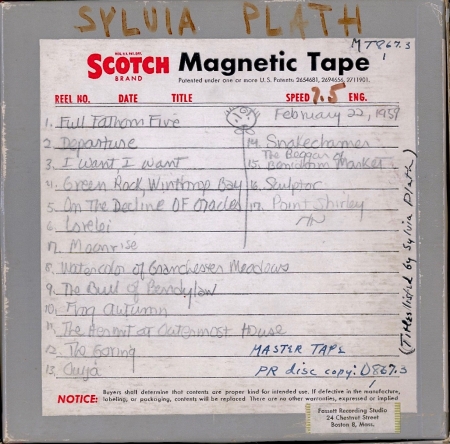
The Woodberry Poetry Room, the landmark archive of literary recordings at Harvard University (est. 1931), has received a 2024–2026 Mellon Foundation Public Knowledge Grant to preserve almost 100 years of cultural heritage recordings and to bring down the barriers of access to these materials by creating The Library of Voices (LOV) website.
With this $250,000 grant from the Mellon Foundation, the Woodberry Poetry Room (part of Houghton Library) will pilot the LOV access portal and a custom streaming player, The Vocarium, specifically designed to reimagine the encounter with recorded sound.
Tom Hyry, Associate University Librarian for Archives and Special Collections and Florence Fearrington Librarian of Houghton Library, expressed his gratitude to the Mellon Foundation. Hyry said, “The Woodberry Poetry Room’s remarkable collections will be greatly enhanced by this generous Mellon grant. The new LOV will not only preserve these incredible literary recordings for the future, but will make them openly accessible to both the Harvard community and the general public.”
The preliminary phase of the two-year project will focus on the preservation of 2,000 reel-to-reel recordings created between 1947 and 1990. According to curators Christina Davis and Mary Walker Graham, this large-scale digitization effort is driven by the crucial need to preserve at-risk media against irrevocable content loss and to ensure the survival of these vital voices.
Among the recordings are readings, interviews, and performances by: Ai, John Ashbery, Amiri Baraka, Jorge Luis Borges, Elizabeth Bishop, Gwendolyn Brooks, Robert Creeley, T. S. Eliot, Robert Frost, Forugh Farrokhzad, Allen Ginsberg, Robert Hayden, Seamus Heaney, June Jordan, Li-Young Lee, Audre Lorde, Robert Lowell, Czeslaw Milosz, Mary Oliver, George Oppen, Sylvia Plath, Adrienne Rich, Anne Sexton, Ntozake Shange, Dylan Thomas, Cecilia Vicuña, and Derek Walcott.

“The Woodberry Poetry Room has always been guided by the belief that recordings of poets and authors can serve a vital democratic role and that encounters with them can give rise to new generations of inspiring and visionary writers, thinkers, activists, and advocates,” said Davis.
Through the creation of a creative, user-friendly website and innovative player, the second phase of the project will seek to transform access to digital recordings and to foster broad and inclusive use by artists, scholars, students, and members of the general public. “The LOV is intended to honor the sonic and spatial dimensions of our art form,” said Davis. Graham added, “It’s an architecture that will help us listen.”
Former US poet laureate and Harvard faculty member Tracy K. Smith ’94 was one of these visionary writers inspired by the Poetry Room’s archive, which she visited often during her time as a poet-in-the-making at Harvard College. “I was one of those undergraduates drawn to a sense of vocational calling by the nearness and the aliveness of this archive, which became a kind of sanctuary for me as I was first immersing myself in the craft and history of poetry,” Smith said.
“A haven like this, in Harvard’s main undergraduate library, is an extraordinary lifeline and I am grateful that the Mellon Foundation will help secure this collection and access to it for generations to come.”
The Andrew W. Mellon Foundation is the nation’s largest supporter of the arts and humanities. Since 1969, the Foundation has been guided by its core belief that the humanities and arts are essential to human understanding. The Foundation believes that the arts and humanities are where we express our complex humanity, and that everyone deserves the beauty, transcendence, and freedom that can be found there.
Through their grants, the Foundation seeks to build just communities enriched by meaning and empowered by critical thinking, where ideas and imagination can thrive.
The LOV website will launch in spring 2026.